Fleurs du Mal Magazine



The Exeter Road
Panels of claret and blue which shine
Under the moon like lees of wine.
A coronet done in a golden scroll,
And wheels which blunder and creak as they roll
Through the muddy ruts of a moorland track.
They daren’t look back!
They are whipping and cursing the horses. Lord!
What brutes men are when they think they’re scored.
Behind, my bay gelding gallops with me,
In a steaming sweat, it is fine to see
That coach, all claret, and gold, and blue,
Hop about and slue.
They are scared half out of their wits, poor souls.
For my lord has a casket full of rolls
Of minted sovereigns, and silver bars.
I laugh to think how he’ll show his scars
In London to-morrow. He whines with rage
In his varnished cage.
My lady has shoved her rings over her toes.
‘Tis an ancient trick every night-rider knows.
But I shall relieve her of them yet,
When I see she limps in the minuet
I must beg to celebrate this night,
And the green moonlight.
There’s nothing to hurry about, the plain
Is hours long, and the mud’s a strain.
My gelding’s uncommonly strong in the loins,
In half an hour I’ll bag the coins.
‘Tis a clear, sweet night on the turn of Spring.
The chase is the thing!
How the coach flashes and wobbles, the moon
Dripping down so quietly on it. A tune
Is beating out of the curses and screams,
And the cracking all through the painted seams.
Steady, old horse, we’ll keep it in sight.
‘Tis a rare fine night!
There’s a clump of trees on the dip of the down,
And the sky shimmers where it hangs over the town.
It seems a shame to break the air
In two with this pistol, but I’ve my share
Of drudgery like other men.
His hat? Amen!
Hold up, you beast, now what the devil!
Confound this moor for a pockholed, evil,
Rotten marsh. My right leg’s snapped.
‘Tis a mercy he’s rolled, but I’m nicely capped.
A broken-legged man and a broken-legged horse!
They’ll get me, of course.
The cursed coach will reach the town
And they’ll all come out, every loafer grown
A lion to handcuff a man that’s down.
What’s that? Oh, the coachman’s bulleted hat!
I’ll give it a head to fit it pat.
Thank you! No cravat.
~They handcuffed the body just for style,
And they hung him in chains for the volatile
Wind to scour him flesh from bones.
Way out on the moor you can hear the groans
His gibbet makes when it blows a gale.
‘Tis a common tale.~
Amy Lowell
(1874 – 1925)
The Exeter Road
Poem
• fleursdumal.nl magazine
More in: Archive K-L, Archive K-L, Lowell, Amy
Op 20 februari 1909 luidt de Italiaanse dichter F.T. Marinetti met zijn futuristisch manifest in de Franse krant Le Figaro een nieuw artistiek tijdperk in.
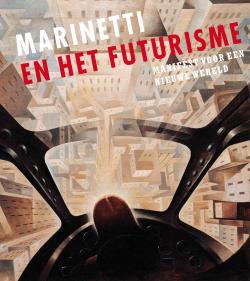 In het manifest bezingt hij de snelheid, de toekomst, agressiviteit en activisme, en wijst hij het verleden resoluut af. Deze ideële uitgangspunten spreken veel jonge kunstenaars en intellectuelen in Italië en Europa aan, waardoor Marinetti al snel een groep jonge futuristen om zich heen heeft verzameld. De futuristen dromen van een radicaal nieuwe toekomst, waarin geen plek is voor het verleden.
In het manifest bezingt hij de snelheid, de toekomst, agressiviteit en activisme, en wijst hij het verleden resoluut af. Deze ideële uitgangspunten spreken veel jonge kunstenaars en intellectuelen in Italië en Europa aan, waardoor Marinetti al snel een groep jonge futuristen om zich heen heeft verzameld. De futuristen dromen van een radicaal nieuwe toekomst, waarin geen plek is voor het verleden.
Hun avant-gardistische ideologie, in al zijn veelzijdigheid en complexiteit, groeide uit tot een voorbeeld voor de modernistische mentaliteit van de twintigste eeuw.
Tentoonstelling Marinetti en het Futurisme
nog t/m19 februari 2023
in Rijksmuseum Twenthe, Enschede
Lasondersingel 129-131, 7514 BP Enschede
T 053 2012000
Reguliere openingstijden
Dinsdag t/m zondag 10.00-17.00 uur
Catalogus bij de tentoonstelling:
Marinetti en het Futurisme
Uitgeverij Waanders
Nederlands
24 x 27 cm
80 pagina’s
60 illustraties
Paperback
ISBN 9789462623224
€ 23,95
• fleursdumal.nl magazine
More in: - Book News, Archive M-N, Archive M-N, Exhibition Archive, Futurism, Futurisme
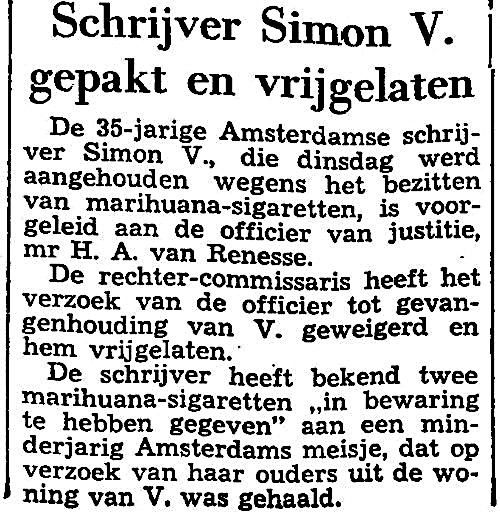
Simon Vinkenoog (1928 – 2009) was een Nederlands schrijver, dichter, vertaler en samensteller van bloemlezingen. Bovendien een groot liefhebber en kenner van seks, drugs en rock-‘n-roll.
Zijn fascinatie voor en kennis van hallucinogene middelen, bracht hem regelmatig in aanraking met justitie.
Een bericht uit Dagblad De Waarheid van zaterdag 21 december 1963.
Simon Vinkenoog
• fleursdumal.nl magazine
More in: Archive U-V, Archive U-V, Art & Literature News, DRUGS & DISEASE & MEDICINE & LITERATURE, Simon Vinkenoog, Simon Vinkenoog

Féerie
La lune mince verse une lueur sacrée,
Toute une jupe d’un tissu d’argent léger,
Sur les bases de marbre où vient l’Ombre songer
Que suit d’un char de perle une gaze nacrée.
Pour les cygnes soyeux qui frôlent les roseaux
De carènes de plume à demi lumineuse,
Elle effeuille infinie une rose neigeuse
Dont les pétales font des cercles sur les eaux . . .
Est-ce vivre ?… Ô désert de volupté pâmée
Où meurt le battement faible de l’eau lamée,
Usant le seuil secret des échos de cristal . . .
La chair confuse des molles roses commence
À frémir, si d’un cri le diamant fatal
Fêle d’un fil de jour toute la fable immense.
Paul Valéry
(1871-1945)
Féerie
Poème
Album de vers anciens
• fleursdumal.nl magazine
More in: Archive U-V, Archive U-V, Valéry, Paul
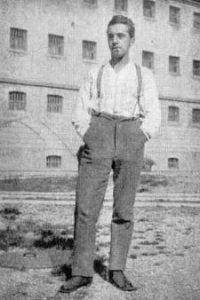
Ein Gefangener reicht dem Tod die Hand
Erst hörte man den Schrei der armen Kreatur.
Dann poltern Flüche durch die aufgescheuchten Gänge,
Sirenen singen die Alarmgesänge,
In allen Zellen tickt die Totenuhr.
Was trieb dich, Freund, dem Tod die Hand zu reichen?
Das Wimmern der Gepeitschten? Die geschluchzten Hungerklagen?
Die Jahre, die wie Leichenratten unsern Leib zernagen?
Die ruhelosen Schritte, die zu unsern Häuptern schleichen?
Trieb dich der stumme Hohn der leidverfilzten Wände,
Der wie ein Nachtmahr unsre Brust bedrückt?
Wir wissen’s nicht. Wir wissen nur, daß Menschenhände
Einander wehe tun. Daß keine Hilfebrücke überbrückt
Die Ströme Ich und Du. Daß wir den Weg verlieren
Im Dunkel dieses Hauses. Daß wir frieren.
Ernst Toller
(1893 – 1939)
Ein Gefangener reicht dem Tod die Hand
• fleursdumal.nl magazine
More in: Archive S-T, Archive S-T, Toller, Ernst

The Realists
Hope that you may understand!
What can books of men that wive
In a dragon-guarded land,
Paintings of the dolphin-drawn
Sea-nymphs in their pearly wagons
Do, but awake a hope to live
That had gone
With the dragons?
William Butler Yeats
(1865-1939)
The Realists
• fleursdumal.nl magazine
More in: Archive Y-Z, Archive Y-Z, Yeats, William Butler

Ich weiß
Ich weiß, daß ich bald sterben muß
Es leuchten doch alle Bäme
Nach langersehtem Julikuß –
Fahl werden meine Träume –
Nie dichtete ich einen trüberen Schluß
In den Büchern meiner Reime.
Eine Blume brichst du mir zum Gruß –
Ich liebte sie schon im Keime.
Doch ich weiß, daß ich bald sterben muß.
Mein Odem schwebt über Gottes Fluß
Ich setze leise meinen Fuß
Auf den Pfad zum ewigen Heime.
Else Lasker-Schüler
(1869 – 1945)
Ich weiß
• fleursdumal.nl magazine
More in: #Editors Choice Archiv, Archive K-L, Archive K-L, Lasker-Schüler, Else
Confronted with a terminal cancer diagnosis, Jay Hopler–author of the National Book Award-finalist The Abridged History of Rainfall–got to work.
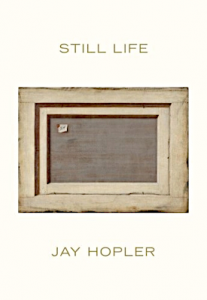 The result of that labor is Still Life, a collection of poems that are heartbreaking, terrifying, and deeply, darkly hilarious.
The result of that labor is Still Life, a collection of poems that are heartbreaking, terrifying, and deeply, darkly hilarious.
In an attempt to find meaning in a life ending right before his eyes, Hopler squares off against monsters real and imagined, personal and historical, and tries not to flinch.
This work is no elegy; it’s a testament to courage, love, compassion, and the fierceness of the human heart.
It’s a violently funny but playfully serious fulfillment of what Arseny Tarkovsky called the fundamental purpose of art: a way to prepare for death, be it far in the future or very near at hand.
Jay Hopler was born in San Juan, Puerto Rico, in 1970. He earned a BA in English and American Literature from New York University, an MA in Creative Writing from the Johns Hopkins University Writing Seminars, an MFA in Creative Writing from the Iowa Writers’ Workshop, and a PhD in American Studies from Purdue University. His first collection of poetry, Green Squall (2006), was chosen by Louise Glück as the winner of the Yale Younger Poets Prize; his second collection, The Abridged History of Rainfall (2016), was a finalist for the National Book Award in Poetry.
Hopler’s poems take as their starting point a formal virtuosity rooted in idiosyncrasy, passion of vision, and the beautiful (sometimes not-so-beautiful) violence of emotion. They are by turns plainspoken, erudite, opaque, clear, serious, and broodingly funny. Hopler is a dexterous poet, but never dogmatic. His poems make sense but not points; they think and reel and describe the broken world, without a wasted word. What the likes of G.M. Hopkins and Wallace Stevens and Robert Hayden carried out, Jay Hopler continues and expands upon, to gorgeous effect. According to poet Katie Ford, “Hopler’s vision and voice [are] both painfully complex because of how much of the world he allows to attach to him, to stake its claim on him.” Hopler is also an editor and translator.
His works include The Killing Spirit: An Anthology of Murder for Hire (1998), Before the Door of God: An Anthology of Devotional Poetry (edited with his spouse, poet and Renaissance scholar Kimberly Johnson, 2013), and The Museum of Small Dark Things: 25 Poems by Georg Trakl (2016).
The recipient of numerous honors and awards, including a Fellowship from the Lannan Foundation, a Whiting Award, the Great Lakes Colleges Association New Writers Award, two National “Best Books” Award from USA Book News, two Florida Book Awards, a Foreword Reviews Book-of-the-Year Award, and the Rome Prize in Literature, Hopler directs the program in creative writing at the University of South Florida.
Still Life
Jay Hopler (Author)
Publisher: McSweeney’s
Publish Date: June 07, 2022
Dimensions
6.36 X 8.5 X 0.46 inches
Language English
Hardcover
EAN/UPC 9781952119378
Price $18.00
• fleursdumal.nl magazine
More in: #Editors Choice Archiv, - Book News, - Bookstores, Archive G-H, Archive G-H

Nimmer schor is de maan
Zwier de korrels uit de aren, dorsers! Het bier en brood
van morgen moet jullie akkers uit. Op stille tenen verklaart
gelukkig de middag zich geduldig nader. Dat kreupelhout
onwillig is en de spar ontschorst. Dat regen op komst lijkt:
hoge wolken zijn gestreept als de borstveren van een havik.
De wijze weet dat de maan nimmer schor is en heeft een
naam die eigenlijk zachte dieren zouden moeten dragen.
Onderaan de dijk bloeit in pruilende klei de grote bevernel.
Bert Bevers
Nimmer schor is de maan
Verschenen in de catalogus Enghuizer dialogen, Hummelo, 2019
• fleursdumal.nl magazine
More in: #Editors Choice Archiv, Archive A-B, Archive A-B, Bevers, Bert
Wroeging
Hij verzamelde geld. Oud geld, nieuw geld, geld. Zijn huis was van geld, zijn tafel, zijn stoel, zijn tv, zijn vrouw, zijn zoon, zijn baby, zijn 06, zijn laptop, zijn auto, zijn tuin, zijn muren, zijn ramen, zijn huidige geld, zijn toekomstige geld, zijn wereld, alles van geld. In een droom zag hij zichzelf, zijn armen griezelig veranderd in briefjes van tien, zijn ogen zich harden tot munten van twee, zijn hart tot toren van munten verhard, zijn beide handen uit munten gesmeed. Zijn vrouw die op de achtergrond zijn portemonnaie kust. Hij begon te huilen als een kind dat wakker schrikt in het geloof dat zijn pasgedroomde nachtmerrie werkelijkheid is, tot hopelijk een lieve mama deze ontkent en hem geruststelt. Hij huilde steeds harder en harder en harder tot en met de volwassene die ineens voelt, weet dat zijn nachtmerrie zijn ware nachtmerrie blijkt.
Freda Kamphuis
Wroeging
Gedicht
• fleursdumal.nl magazine
More in: #Editors Choice Archiv, Archive K-L, Archive K-L, Kamphuis, Freda
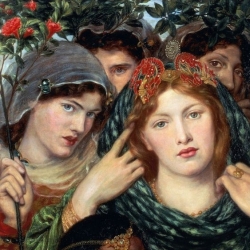
A New-Year’s Burden
Along the grass sweet airs are blown
Our way this day in Spring.
Of all the songs that we have known
Now which one shall we sing?
Not that, my love, ah no!—
Not this, my love? why, so!—
Yet both were ours, but hours will come and go.
The grove is all a pale frail mist,
The new year sucks the sun.
Of all the kisses that we kissed
Now which shall be the one?
Not that my love, ah no!—
Not this, my love?—heigh-ho
For all the sweets that all the winds can blow!
The branches cross above our eyes,
The skies are in a net:
And what’s the thing beneath the skies
We two would most forget?
Not birth, my love, no, no,—
Not death, my love, no, no,—
The love once ours, but ours long hours ago.
Dante Gabriel Rossetti
(1828 – 1882)
A New-Year’s Burden
• fleursdumal.nl magazine
More in: *The Pre-Raphaelites Archive, Archive Q-R, Archive Q-R, Lizzy Siddal, Rossetti, Dante Gabriel
Thank you for reading Fleurs du Mal - magazine for art & literature